Shaykh Khaled Abather al-Attiyah (also transliterated as Attia) is an Iraqi politician who was elected in December 2005 to the Council of Representatives as an independent member of the United Iraqi Alliance.
On 22 April 2006 he was elected First Deputy Speaker of the Iraqi National Assembly.
He was born in 1949 in the Shamiyah District and graduated from Law College in Najaf in 1970. He went on to Cairo University where he obtained a Diploma in Shari'a in 1980 and a master's degree in Literature in 1985.
He was worked at the Al-Dar al-Islami Foundation in Iran until 1994 when he moved to Lebanon to head the Al-Ghadir Center for Islamic Studies in Beirut. He also edited the publication Al-Manahij in Beirut from 1995. In 2000 he moved to England where he was the Dean of the Islamic Studies Department at Oxford University and editor of Al-Balagh. In 2003 he returned to Iraq.

Ibrahim Abdul Karim al-Eshaiker, better known as Ibrahim al-Jaafari, is an Iraqi politician who was Prime Minister of Iraq in the Iraqi Transitional Government from 2005 to 2006, following the January 2005 election. He served as Minister of Foreign Affairs from 2014 to 2018.

The Islamic Dawa Party, is an Iraqi Shia Islamist political movement that was formed in 1957 by seminarians in Najaf, Iraq, and later formed branches in Lebanon and Kuwait. The Party backed the Iranian Revolution and also Ayatollah Ruhollah Khomeini during the Iran–Iraq War. It also opposed the Iraq War. Iran played a crucial role in the development of the movement, especially its Lebanese branch which later became Hezbollah. In 2019, the Dawa Party was reportedly suffering from internal divisions and is in danger of losing its "political relevance". The Islamic Dawa Party is led by Nouri Al-Maliki.

Muhammad Baqir al-Sadr, also known as al-Shahid al-Khamis, was an Iraqi Islamic scholar, philosopher, and the ideological founder of the Islamic Dawa Party, born in al-Kadhimiya, Iraq. He was father-in-law to Muqtada al-Sadr, a cousin of Muhammad Sadeq al-Sadr and Imam Musa as-Sadr. His father Haydar al-Sadr was a well-respected high-ranking Shi'a cleric. His lineage can be traced back to Muhammad through the seventh Shia Imam Musa al-Kazim. Muhammad Baqir al-Sadr was executed in 1980 by the regime of Saddam Hussein along with his sister, Amina Sadr bint al-Huda.

Grand Ayatollah Sayyid Abu al-Qasim al-Musawi al-Khoei was an Iranian-Iraqi Shia marja'. Al-Khoei is considered one of the most influential twelver scholars.
Hassan Khaled was the leader of Lebanon's Sunni Muslim community. As a grand mufti, he presided over Islamic courts in Lebanon for 23 years, and served as Head of the Islamic Coalition, a body which included past and present prime ministers, Sunni parliamentary figures, and Sunni members of Lebanon's government. He was considered a moderate, and upon his assassination was named as the "father of moderation," as he worked throughout his career to bring unity to the warring factions of the Lebanese Civil War. Khaled's assassination in 1989 was widely believed to be the work of Syria.

Sāṭi` al-Ḥuṣrī, born Abu Khaldun Sati' al-Husri, was an Ottoman, Syrian and Iraqi writer, educationalist and an influential Arab nationalist thinker in the 20th century.
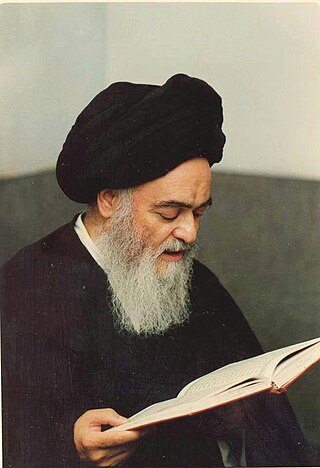
Grand Ayatollah Sayyid Muhammad al-Husayni al-Shirazi, commonly known as Imam Shirazi, was an Iranian-Iraqi Shia marja' and political activist.
Jabra Ibrahim Jabra was an Iraqi-Palestinian author, artist and intellectual born in Adana in French-occupied Cilicia to a Syriac Orthodox Christian family. His family survived the Seyfo Genocide and fled to the British Mandate of Palestine in the early 1920s. Jabra was educated at government schools under the British-mandatory educational system in Bethlehem and Jerusalem, such as the Government Arab College, and won a scholarship from the British Council to study at the University of Cambridge. Following the events of 1948, Jabra fled Jerusalem and settled in Baghdad, where he found work teaching at the University of Baghdad. In 1952 he was awarded a Rockefeller Foundation Humanities fellowship to study English literature at Harvard University. Over the course of his literary career, Jabra wrote novels, short stories, poetry, criticism, and a screenplay. He was a prolific translator of modern English and French literature into Arabic. Jabra was also an enthusiastic painter, and he pioneered the Hurufiyya movement, which sought to integrate traditional Islamic art within contemporary art through the decorative use of Arabic script.
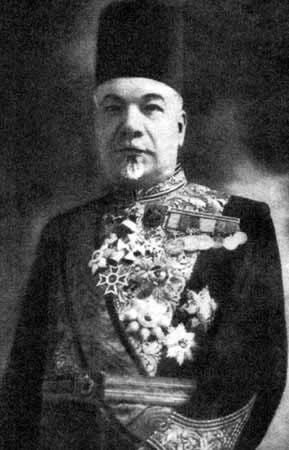
Muhammad Ali Bey al-Abid or, as he spelled his own name in French, Mehmed Ali Abed, was appointed the president of the mandatory Syrian Republic as a nominee of the nationalist Syrian parliament in Damascus after the country received partial recognition of sovereignty from France. France agreed to recognize Syria as a nation under intense nationalist pressure but did not withdraw its troops completely until 1946.

Majid Khadduri was an Iraqi–born academic. He was founder of the Paul H. Nitze School of Advanced International Studies Middle East Studies program, a division of Johns Hopkins University based in Washington, D.C. Internationally, he was recognized as a leading authority on a wide variety of Islamic subjects, modern history and the politics of the Middle East. He was the author of more than 35 books in English and Arabic and hundreds of articles.

Chibli Mallat is a Lebanese international lawyer, legal scholar, and a former candidate for presidency in Lebanon.
Nader El-Bizri served as the Dean of the College of Arts, Humanities, and Social Sciences at the University of Sharjah. He was before that a tenured longstanding full Professor of philosophy and civilization studies at the American University of Beirut, where he also acted as an Associate Dean of the Faculty of Arts and Sciences, and as the Director of the General Education program. El-Bizri specializes in phenomenology, Islamic science and philosophy, and architectural theory. He is the author or editor of several books, including The Phenomenological Quest between Avicenna and Heidegger (2000).

Jamil Sidqi al-Zahawi was a prominent Iraqi poet and philosopher. He is regarded as one of the greatest contemporary poets of the Arab world and was known for his defence of women's rights.

Sinan Antoon, is an Iraqi poet, novelist, scholar, and literary translator. He has been described as "one of the most acclaimed authors of the Arab world." Alberto Manguel described him as "one of the great fiction writers of our time.” He is an associate professor at the Gallatin School of Individualized Study at New York University.
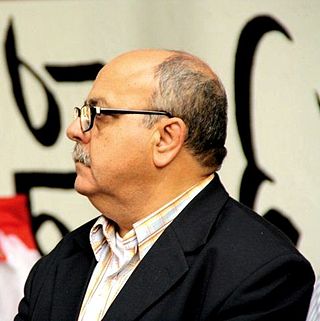
Abdulrazak Eid, Abdul razzak Eid, Abdul razaq Eid, Abdel razzak Eid, Abdul razzaq Eid, or Abd al Razzaq 'Id is a Syrian writer and thinker and one of Syria's leading reformers. He helped to found the Committees of Civil Society in Syria, drafted the Statement of 1000 and helped to draft the Damascus Declaration. Because of his opposition writings and political actions, he was arrested many times in Syria, banned from working and traveling, kidnapped by the Syrian intelligence forces, and was threatened with being assassinated. He fled Syria in 2008 for exile in Europe where he was elected president of the National Council of Damascus Declaration in exile.
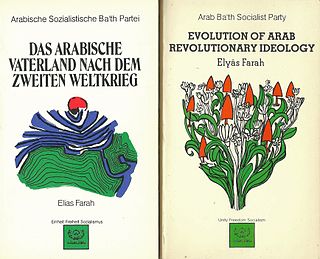
Elias Farah was a Syrian writer who wrote several books about Arab nationalism and the subject of Arab thoughts and ideology, as advocated by the Ba’ath Party, many of which were translated to several languages. He served as the Director of the Academy of the Arab Ba'ath Socialist Party in Baghdad.
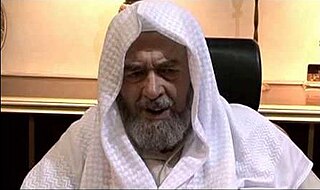
Subhi bin Jassim bin Humaid al-Badri al-Samarrai (1936–2013) was a leading Iraqi muhaddith and one of the founders of Salafi movement in Iraq.
Jaafar Mohammed Baqir al-Sadr is an Iraqi politician with the Shiite Islamist Islamic Dawa Party.
Muhsin Baqir al-Musawi al-Qazwini is an Iraqi author, politician, essayist, college professor, and founder of the Ahl al-Bayt University in Karbala.
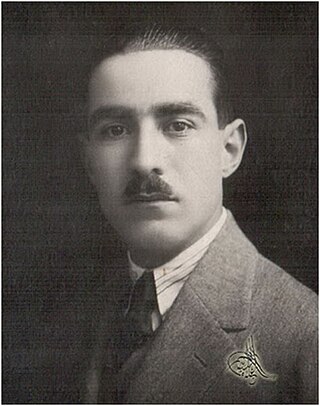
Rushdi al-Kikhya was a Syrian political leader who founded the People's party in 1948. Kikhya was elected as a Speaker of the Parliament of Syria between 1949 and 1951, and he was elected five terms as a member of the Syrian Parliament (MP). Kikhiya also served as minister of interior in 1949.